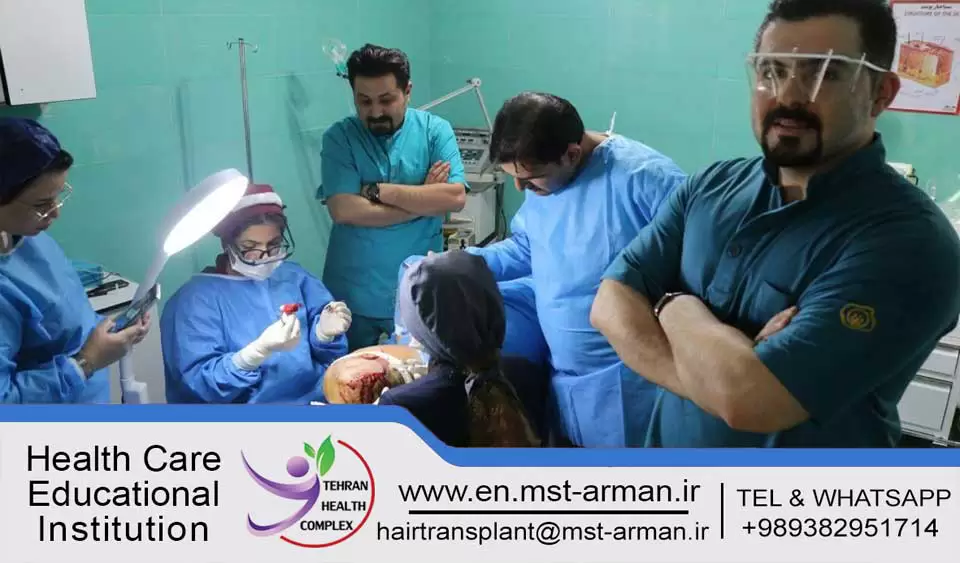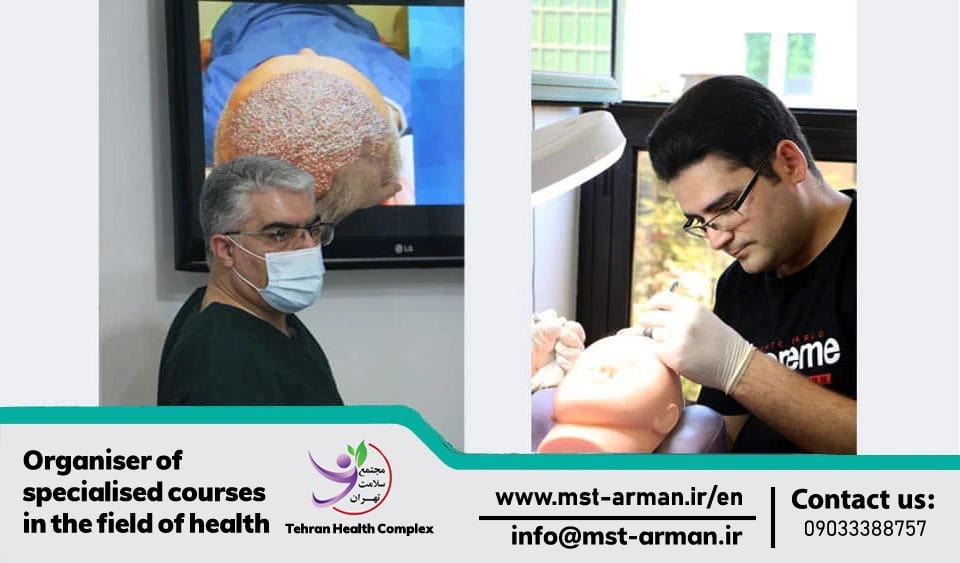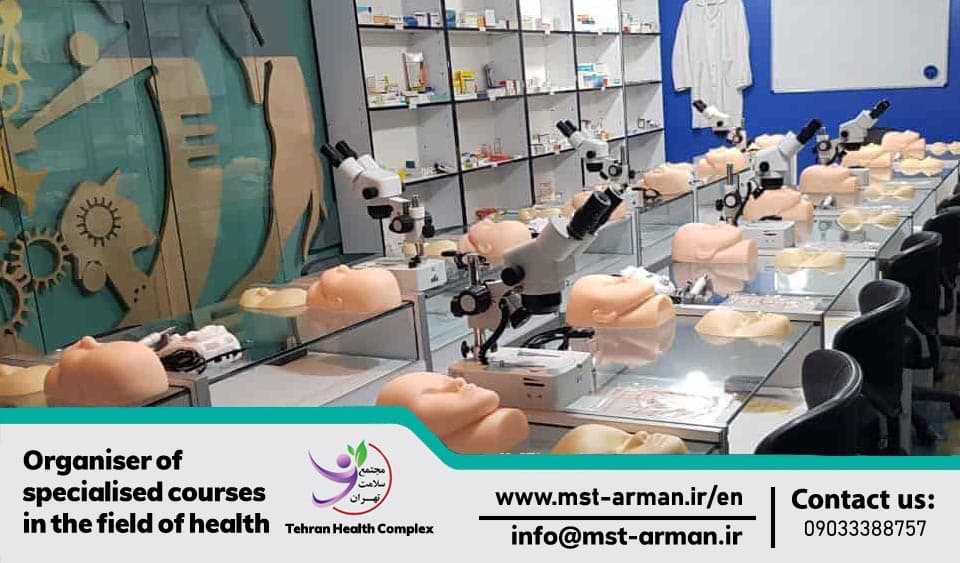Hair Transplantation Course
The training course for hair transplantation is one of the most practical and popular courses currently offered in hair transplantation clinics. These clinics offer hair transplantation training at competitive prices compared to other institutions. Additionally, there is the option to pay for this course in installments.
Degree value: 5 out of 5
Course type:
in person
Course level:
professional
Duration:
5 sessions 5 hours
Support:
unlimited
Evidence:
Authentic and questionable
At the institute, we provide innovative training and quality education for hair transplant course. Due to the development of medical services and the number of doctors and trained experts in the field…
Hair Transplant Course
At the institute, we provide innovative training and quality education for Hair Transplantation Course. Due to the development of medical services and the number of doctors and trained experts in the field of hair transplantation, educational fees have become much cheaper in Iran rather than in other countries. In the hair transplant course, the latest hair transplant techniques are taught. Our course covers all standard aspects of hair transplantation, both theoretical and practical. The training for graduate doctors, technicians, nurses and other paramedical fields contains hands-on training on real patients.

Hair Transplantation Course
Our training are set according to our trainees needs, courses start from a usual lecture in order for trainees to know basic subjects about hair and hair transplant and the last technology and newest methods and plans in order not only for them to become hair transplant experts but to master the procedure and be able to perform as well as they can.
Whether you were a surgeon, doctor, dermatologist or a nurse, the best way to learn is to observe first and practice later, this only will make you able to do operations by yourself.
The Tehran health training academy is dedicated to providing a high level of training to medical professionals whether they are in hair transplant field and want to improve their skills. By the end of your training, you will receive an accredited certificate that proves your attending, after passing an exam that will decide your qualification and abilities.
Scientific Description of the Hair Transplantation Course
The hair transplantation Course is conducted in a way that hair follicles are usually taken from other areas of the scalp, commonly the back of the head. These follicles can be extracted as strips (known as FUT) or individual hair follicles (known as FUE), which forms the basis of different hair transplantation methods.
For example, in the case of strip extraction (a narrow strip of skin with hair), known as FUT, and in the case of individual hair follicle extraction, known as FUE, some patients may have a weak hair bank at the back of their head. In such cases, other sources like facial hair and body hair, referred to as BHT, can be used.
During the hair transplantation process, specific tools and equipment are used to facilitate and improve the quality of hair transplantation. One of these items is a micro-motor, which is used in the FUE hair transplantation method and aids in the separation of hair strands (hair follicles), commonly referred to as SUT.
In the hair transplantation training course, you will become familiar with various specialized and different hair grafting techniques. This training will prepare you for a successful future in the field of hair transplantation, allowing you to gradually establish a strong reputation. Learning hair transplantation from individuals who are well-known throughout the country due to their extensive successful experience is an ideal opportunity for you.
Chapters in the Practical Section of the Hair Transplantation Course
- First Session: Hair Transplantation | Local Anesthesia Practice (Molage).
- Second Session: Separating Hair Strands | Working with a Loop (Molage).
- Third Session: Using the Micro-Motor and Removing Hair Follicles.
- Fourth Session: Hair Transplantation on the Patient’s Scalp.
Topics Covered in the Theoretical Section of the Hair Transplantation Course
- Types of Hair Transplantation Models
- Hair Transplantation Complications
- Pre- and Post-Transplantation Measures
- Hair Transplantation Videos and Images
- Consultation Tips
- Choosing a Transplantation Model
- Who Can Obtain a Hair Transplantation Certificate?

Hair transplant training class at Tehran Health Complex
To obtain this certificate, you need to have a comprehensive understanding of scalp anatomy and nursing procedures. Therefore, medical doctors, nurses, and paramedics with sufficient knowledge in these areas can take the course without prerequisites. Specialized hair transplantation clinics have designed two prerequisite sessions for individuals from unrelated fields who wish to pursue hair transplantation training to familiarize them with these subjects. Completing these two sessions is mandatory to obtain the hair transplantation certificate.
In the end, an examination (similar to the entrance exams for related fields) is conducted for graduates.
Differences Between Hair Transplantation Courses
The main concern for those looking for the best hair transplantation course is whether the course they choose will lead to success in practical application. Will all essential details be taught in this course?
In recent years, specialized hair transplantation clinics have made every effort to provide the best and most comprehensive training for participants in these courses, with the aim of improving the quality of hair transplantation education. This not only satisfies patients but also boosts the careers of course participants. Hair transplantation centers go to great lengths to ensure that trainees achieve mastery and expertise in all aspects of the procedure, even after the course is completed. Graduates can benefit from post-course support.
Installment Payment for Hair Transplantation Training
These days, people place great importance on the beauty of their hair, and individuals from all walks of life turn to hair transplantation to treat their hair loss or thinning. As a result, hair transplantation has become a high-earning profession, attracting medical doctors, nurses, and individuals from other fields who want to become hair transplant technicians. Specialized hair transplantation clinics have decided to offer hair transplantation training in installments to make it accessible to those who cannot pay for the course in a lump sum.
For information about installment conditions, you can contact the consultants at hair transplantation centers.
Types of Hair Transplantation Methods
Hair transplantation is generally performed using two methods: FUE (Follicular Unit Extraction) and FUT (Follicular Unit Transplantation). The FUE method is considered the newest and involves extracting follicles from a dense area of the scalp known as the hair bank and implanting them in areas with hair loss.
The FUT method, which was the first hair transplantation method and is still used today, a strip of skin with hair is removed from the back of the head and transplanted into areas with thinning hair.
Hair Transplantation Training
There are many centers that offer hair transplantation training, but only a few provide highly specialized and professional training in hair transplantation. The emphasis in these courses is on the practical aspect.
Specialized hair transplantation centers prioritize hands-on training under the guidance of instructors, where instructors perform the transplantation procedure on a patient while trainees observe, and trainees also perform the procedure on a patient under the instructor’s supervision. This approach allows trainees to address any issues or weaknesses in their skills.
The advantage of most hair transplantation clinics over other institutions is their focus on the practical aspect of the training. During practical sessions, you will observe the instructor performing the transplantation procedure on a patient, and you will also have the opportunity to perform the procedure yourself on a patient. This hands-on experience helps improve your skills in each area.
Best and Oldest Hair Transplant Courses

The best practical course of hair transplant courses
Hair transplant is a process in which some of the scalp hairs are grafted onto areas that lack hair, and they grow as new hair. The first formal hair transplant method was performed in the 1930s by Dr. Yablokov in Russia.
Currently, hair transplant courses have evolved to their best and most comprehensive form, using advanced techniques like the Follicular Unit Extraction (FUE) method. In this approach, healthy hairs are individually extracted using specialized devices and then transplanted into areas of the scalp that lack hair.
To find the best and oldest hair transplant courses, it’s important to note that hair transplant procedures should be performed by experienced and qualified medical professionals to avoid potential issues such as hair graft rejection, infections, and bleeding. All these considerations are meticulously followed in hair transplant institutes, making them one of the best and oldest sources for hair transplant education.
About our hair transplant clinic
Health and aesthetics have been serious and sensitive issues for all people all over the time.Providing service in areas that include both aesthetics and health, requires a great knowledge. We are always researching and following the developments in the world. With the rooms that are equipped with the latest and most complete technology, to provide services and educate trainees for their aim.
Subjects
It starts with a detailed explanation of hair anatomy, hair types, various and newer techniques, as the training relies on the use of the most innovative techniques in this field, and 90% of the practice, at every stage of the intervention, in this way you will
definitely not miss any details.
For trainees without a medical background
the training begins with a training course, they will also attend the operations and will be explained in every step of the hair transplant process.
Post-Course Support
Post-course support is a crucial and integral part of the hair transplant learning process. After performing a hair transplant procedure, questions and concerns may arise, requiring guidance for medical professionals and specialists involved in the procedure.
Specific guidelines and support needed may vary depending on the hair transplant technique, the patient’s skin and hair type. However, in general, after acquiring the skills for hair transplantation, questions and needs will emerge. If faced with any issues, individuals can rely on the support and guidance provided by hair transplant centers.
Free Download of Hair Transplant Training Materials
The training materials for hair transplantation cover fundamental and practical topics in the field of hair transplantation and are designed for technicians and individuals interested in working in this field. The materials include chapters on skin structure, head and neck anatomy, principles of suturing, familiarity with equipment, and specialized topics in hair transplantation, all presented with up-to-date visuals.
In this manual, topics such as head and neck anatomy, including muscles, veins, nerves, and lymphatics, familiarity with skin and hair structure, different skin layers, factors affecting hair loss, skin and hair diseases, principles of suturing, types of stitches, familiarity with equipment needed for suturing, as well as consumable and general equipment, surgical kits, and necessary medications for hair transplantation, are covered.
In summary, this text provides an overview of hair transplant courses and related information, emphasizing the importance of proper training and post-course support for medical professionals and individuals interested in this field.
Frequently Asked Questions About Hair Transplant Courses
- Course Certificate?
A certificate of international recognition is awarded to individuals who successfully complete the course. - Who Can Participate in Hair Transplant Courses?
These courses are open to the general public, and anyone can participate in a hair transplant assistant course. However, participants must complete prerequisite sessions. Nurses, doctors, and paramedics may not require prerequisites. - Can we pay for the Hair Transplant Course in Installments?
Yes, you can pay for the hair transplant training course either in installments or as a lump sum. - Are Classes Conducted In Person?
Yes, the classes are conducted in person and include practical components. - Can We Open a Hair Transplant Clinic After Obtaining the Certificate?
Only individuals who have obtained a hair transplant certificate and have a medical background as doctors, surgeons, or nurses can open a hair transplant clinic.
$2,500

